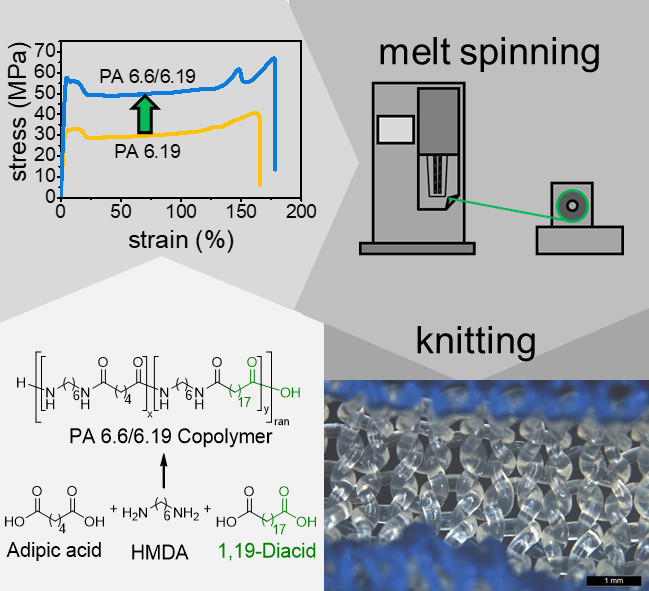News
Toughening of Bio-Based PA 6.19 by Copolymerization with PA 6.6 – Synthesis and Production of Melt-Spun Monofilaments and Knitted Fabrics
05.06.2023
Maximilian Rist, Henning Löcken, Mathias Ortega, and Andreas Greiner
Macromol. Rapid Commun. 2023 2300256. https://doi.org/10.1002/marc.202300256
This work reports on the synthesis of statistical copolymers of bio-based PA 6.19 and PA 6.6 together with the production of melt-spun monofilaments for the production of sustainable textile fibers. The plant oil-based 1.19-nonadecanedioic acid is synthesized from bio-derived oleic acid via isomerizing methoxycarbonylation. The homopolymer PA 6.19 with a carbon-based bio-content of 72% shows a good elongation at break of 166%, but lower tensile strength than commercial PA 6 (43 MPa versus 82 MPa). Addition of adipic acid to form statistical PA 6.6/6.19 copolymers improves toughness while maintaining the high elongation at break. Two PA 6.6/6.19 copolymers with a carbon-based bio-content of 26% and 33% are successfully synthesized and exhibited comparable toughness (94 ± 6 MPa and 92 ± 2 MPa) to the commercial PA 6 (92 ± 15 MPa). The bio-based copolymers also exhibit a much lower water uptake than PA 6 and PA 6.6, resulting in a higher dimensional stability. Melt spinning of the oleic acid-based polyamides is successfully carried out to produce monofilaments with sufficient properties for further processing in a knitting process, demonstrating the capabilities of the bio-based PA 6.6/6.19 copolymers for use in the textile industry.


